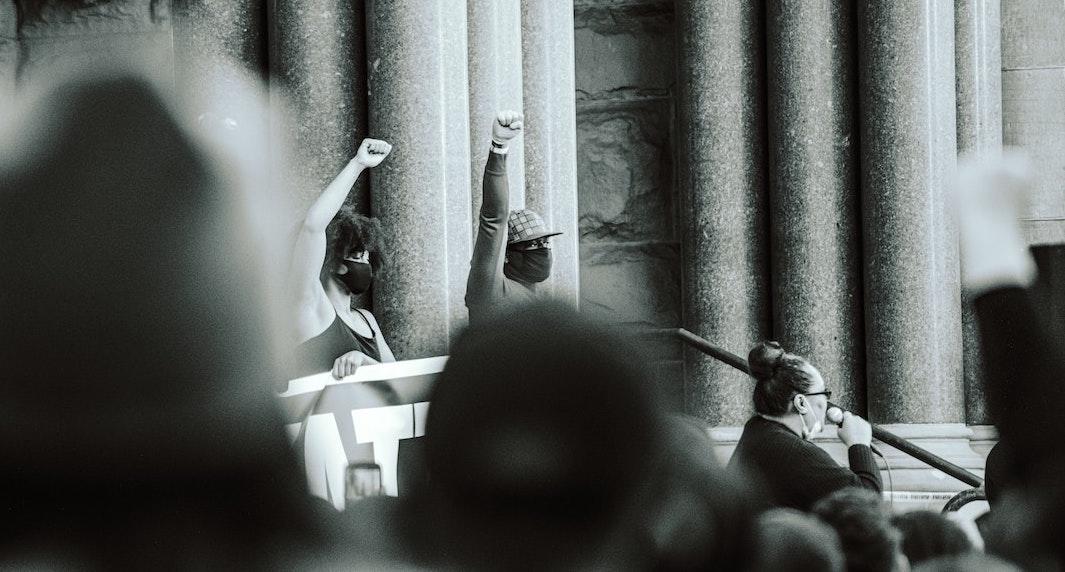Though there is nothing new about systemic racism in the U.S., the brutal killings of George Floyd, Breonna Taylor, Ahmaud Arbery and others in recent months have sparked a national reckoning on racial injustice that has extraordinary implications for the 2020 elections.
Racial justice remains a top priority for voters who are tasked with choosing our nation’s next leaders who will contend with lack of trust in government, ongoing protests in communities across the country and calls to dismantle racist systems in health, financial services and law enforcement.
With just a few short weeks until Election Day, calls for eligible voters to participate in the electoral process have become part of our daily news consumption. Brands are using their platforms to get out the vote, encouraging people to register and voice their priorities through the ballot.
While it’s tempting to lean into the popular narrative that labels voters of color as apathetic, this is a dangerously false notion. Voter suppression is keeping communities of color from the polls—and we need only look to Georgia’s recent issues around purging voter registration rolls to understand the threat that voter suppression poses to our democracy.
As voter participation continues to dominate headlines and campaigns charge ahead against the backdrop of the movement for racial justice, it is important to remember one thing: “Black lives matter” is not political; it is being politicized. The fight for racial justice is neither a Republican nor a Democratic issue, it is an American issue—and one that will look worlds different under each administration.
Here’s our take on racial justice under each potential administration and what’s at stake for brands in the months to come.
Racial Justice Under a Biden Administration
Former Vice President Biden’s agenda, Build Back Better, features a vision to address longstanding racial inequity in the United States. While Biden has been criticized for past stances on criminal justice reform and educational equity, his campaign's plan is aimed at tearing down inequities.
The Racial Equity pillar of the Build Back Better agenda includes investments in opportunity zones, infrastructure, housing and homeownership, energy, education and Historically Black Colleges and Universities (HBCUs) and other sectors.
We can also anticipate Biden will appoint progressive officials who will uphold campaign promises and seek to regain the public trust in government currently hovering around 33 percent.
Racial Justice Under a Trump Administration
President Trump’s rhetoric has unquestionably shaped perceptions of his views on racial justice. President Trump has called Black Lives Matter a “symbol of hate,” making his lack of support for the movement known. Further, his comments around the deadly violence at the 2017 Charlottesville Unite the Right rally continue to play a critical role in this year’s election.
The Edelman Trust Barometer reveals a stark division of support for racial justice protests among major political parties: 38 percent of Republicans support racial justice protests compared to 78 percent of Democrats.
In an attempt to appeal to Black voters, the Trump campaign recently unveiled the Platinum Plan for Black Americans, with key pillars of opportunity, security, prosperity and fairness. While this plan includes investment in areas that will support economic opportunity for Black Americans, like homeownership and job creation, the Trump administration has also made recent policy decisions that ended diversity training for federal employees and overturned the Affirmatively Furthering Fair Housing rule.
Sector Implications
Technology
The tech industry has lacked racial diversity among Black and Latinx talent, while over-indexing on Asian representation. To be sure, poor representation in tech workforces limits professional development and earning potential for people of color in the industry—but it also carries implications for the role of artificial intelligence in society. Ethical artificial intelligence must minimize racial bias, and tech companies must call for full representation as they seek to democratize access to information.
As we’ve seen in recent months, EE0-1 inquiries on workforce diversity and boycotts like #StopHateForProfit stand to disrupt business operations and create crisis. Tech companies must prepare to answer scrutiny with clear actions and transparent reporting on progress.
Financial Services
Racial discrimination has cost the U.S. a staggering $16 trillion, according to Citi’s new study, and economic uncertainty persists alongside the pandemic. The financial services sector will be under close watch for financial discrimination and has been called on to prioritize equitable wealth creation.
Beyond addressing past and future policies to close the racial wealth gap, the industry must prepare to answer questions about recruiting, retaining and promoting diverse talent within their organizations—a historically weak spot for most corporations, but especially this industry, as noted in a report developed this year by the majority staff of the House Committee on Financial Services.
Health care
In the health care space, we know the pre-Covid playbook no longer applies. Covid-19 has exposed several of the most pervasive racial equity issues in the U.S., bringing health care center stage for voters going into the election. From the disproportionately high contraction and death rates among Black Americans to lowering prohibitively high costs for prescription drugs, the health implications of systemic racism are clear.
Health care companies must prepare to demonstrate how they are prioritizing racial equity when delivering on health care solutions and how it will protect the very communities harmed by systemic racism.
Media
Our data shows trust in mainstream and social media is particularly low among Black and Latinx people, and a majority believe media focuses too much on rioting and perpetuates stereotypes of people of color.
Along party lines, only 17 percent of Republicans believe mainstream media to be a source of truth for racism. Media must take an active role in preventing racist imagery and biased storytelling from going unchecked. Media and marketing companies must be intentional about representative storytelling, dismantling tropes constructed and upheld for centuries in the U.S.
Employee Experience
This is a critical time to deliver on the promises to get your house in order made earlier this year. The 2020 Edelman Trust Barometer showed us that “my employer” was the most trusted relationship; employers cannot fail their workforces on addressing racial justice. In addition to a general focus on employee engagement and retention that may be more difficult to maintain in a remote working environment, employers must consider the enormous toll on systemic racism has on employees of color and prepare for the impact felt by employees based on the outcome of the election.
Employers must prepare for a range of potential outcomes: a second term for President Trump, protests, contesting the election results or refusal to peacefully concede. Employers must plan for how to best protect and care for their employees.
There has been much talk about how businesses plan to lead from the front on ending systemic racism and advancing racial justice. In this election, there will be no room for ambivalence or ambiguity on racial justice. Business must answer the call for leadership and progress. In a year marked by grief and loss, especially for Black Americans, how we respond in this moment will be felt for generations to come.




